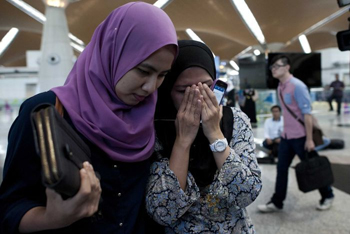 The Hague, Jul 18: Dutch families jetting off to exotic destinations, more than 100 AIDS experts, British football fans and a twice unlucky Australian family were among victims of the doomed Malaysia Airlines plane that crashed in eastern Ukraine.
The Hague, Jul 18: Dutch families jetting off to exotic destinations, more than 100 AIDS experts, British football fans and a twice unlucky Australian family were among victims of the doomed Malaysia Airlines plane that crashed in eastern Ukraine.
As the true horror of the fate of flight MH17 likely shot down in separatist-held territory near the Russian border yesterday continue to unfold a day later, so did the stories behind its victims.
"It was my brother and best friend," said a distraught Sander Essers, 66, who lost his brother Peter, sister-in-law Jolette Neusink and their two children Emma, 20 and Valentijn, 17 in the crash.
"I spoke to my brother 20 minutes before he boarded the flight," an emotional Essers told AFP.
Peter Essers' wife, Jolette, was a clinical psychologist who ran her own practice and ironically worked with victims traumatised by war.
Essers described the couple's daughter Emma, a first-year medical student at the northern Groningen University, as a "lively and adventurous person".
Their son Valentijn, still in high school, loved sport and excelled in tennis and football.
Also on board was prominent former International AIDS Society president Joep Lange, who together with as many as 100 other Aids activists were on their way to Melbourne for the 20th International Aids Conference, media reports said.
"It's unimaginable," Lange's close friend and colleague at the PharmAccess Foundation, Jaap Goudsmit said.
"My wife saw him yesterday (Thursday) morning, before he actually flew," Goudsmit told AFP.
Set up in 2000, the foundation fights for the distribution of anti-retroviral treatment in Africa.
"This is a massive loss. We are devastated," PharmAccess boss Onno Schellekens said in a statement.
The Essers and Lange are among the 189 Dutch victims, who also included florists Cor Schilder, 33 and Neeltje Tol, 30.
In Australia, a family was struck by both yesterday's crash as well as the loss of Malaysia Airlines flight MH370 which went missing in March.
Maree and Albert Rizk, who were returning to Melbourne after a month-long holiday in Europe, died in yesterday's crash, Australian media reported.





Comments
Add new comment